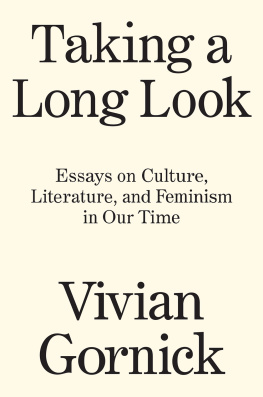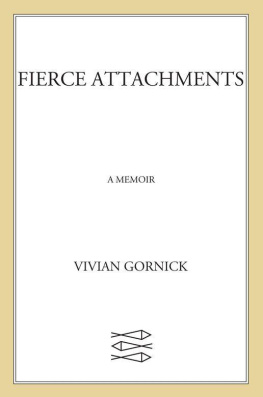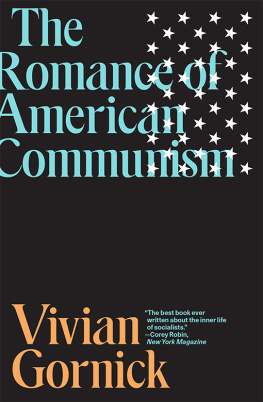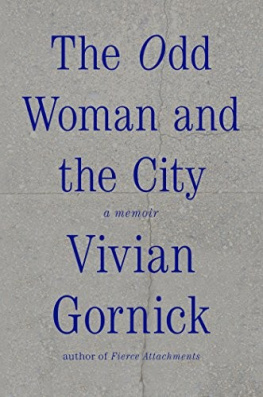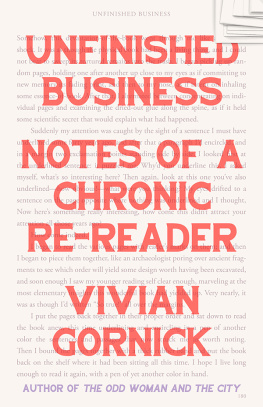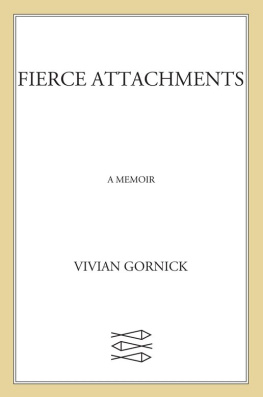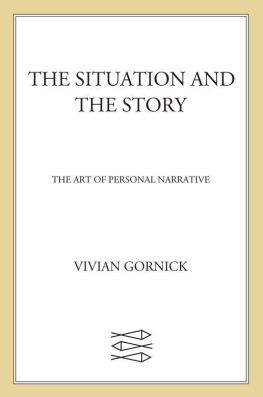Vivian Gornick - Taking a Long Look
Here you can read online Vivian Gornick - Taking a Long Look full text of the book (entire story) in english for free. Download pdf and epub, get meaning, cover and reviews about this ebook. publisher: Verso Books, genre: Art. Description of the work, (preface) as well as reviews are available. Best literature library LitArk.com created for fans of good reading and offers a wide selection of genres:
Romance novel
Science fiction
Adventure
Detective
Science
History
Home and family
Prose
Art
Politics
Computer
Non-fiction
Religion
Business
Children
Humor
Choose a favorite category and find really read worthwhile books. Enjoy immersion in the world of imagination, feel the emotions of the characters or learn something new for yourself, make an fascinating discovery.
- Book:Taking a Long Look
- Author:
- Publisher:Verso Books
- Genre:
- Rating:3 / 5
- Favourites:Add to favourites
- Your mark:
- 60
- 1
- 2
- 3
- 4
- 5
Taking a Long Look: summary, description and annotation
We offer to read an annotation, description, summary or preface (depends on what the author of the book "Taking a Long Look" wrote himself). If you haven't found the necessary information about the book — write in the comments, we will try to find it.
Taking a Long Look — read online for free the complete book (whole text) full work
Below is the text of the book, divided by pages. System saving the place of the last page read, allows you to conveniently read the book "Taking a Long Look" online for free, without having to search again every time where you left off. Put a bookmark, and you can go to the page where you finished reading at any time.
Font size:
Interval:
Bookmark:

and Feminism in Our Time
Vivian Gornick

First published by Verso 2021
Vivian Gornick 2021
The publisher and author express their gratitude to the publications in which earlier versions of these essays appeared. Complete details of prior publication can be found in the acknowledgments.
All rights reserved
The moral rights of the author have been asserted
1 3 5 7 9 10 8 6 4 2
Verso
UK: 6 Meard Street, London W1F 0EG
US: 20 Jay Street, Suite 1010, Brooklyn, NY 11201
versobooks.com
Verso is the imprint of New Left Books
ISBN-13: 978-1-78873-977-1
ISBN-13: 978-1-78873-979-5 (US EBK)
ISBN-13: 978-1-78873-978-8 (UK EBK)
British Library Cataloguing in Publication Data
A catalogue record for this book is available from the British Library
Library of Congress Cataloging-in-Publication Data
Names: Gornick, Vivian, author.
Title: Taking a long look: essays on culture, literature, and feminism in our time / Vivian Gornick.
Description: London; New York: Verso, 2021. | Summary: For nearly fifty years, Vivian Gornicks essays have explored feminism and writing, literature and culture, politics and personal experience. Drawing on writing from the course of her career, this book illuminates one of the driving themes behind Gornicks work: the painful process of understanding ones self that binds us to the larger worldProvided by publisher.
Identifiers: LCCN 2020044297 (print) | LCCN 2020044298 (ebook) | ISBN 9781788739771 (hardback) | ISBN 9781788739795 (ebk)
Subjects: LCGFT: Essays.
Classification: LCC PS3557.O765 T35 2021 (print) | LCC PS3557.O765 (ebook) | DDC 814/.54dc23
LC record available at https://lccn.loc.gov/2020044297
LC ebook record available at https://lccn.loc.gov/2020044298
Typeset in Garamond by Biblichor Ltd, Edinburgh
Printed and bound by CPI Group (UK) Ltd, Croydon CR0 4YY
I can remember the exact moment when I left polemical journalism behind me to begin the kind of nonfiction storytelling I had longed, since childhood, to write. One summer morning, on vacation from my job at the crusading Village Voice where I wrote most often on behalf of radical feminism, I sat down at a makeshift desk in a beachfront hotel room and found myself typing: Im eight years old. My mother and I come out of our apartment onto the second-floor landing. Mrs. Drucker is standing in the open doorway of the apartment next door, smoking a cigarette. These were the first sentences of my memoir, Fierce Attachments, and with them I began the long apprenticeship of a writer who, in the act of making naked use of her own undisguised experience, has taught herself to value writing that serves the story rather than writing that imposes itself on the story. By which I mean: as a polemicist I went in search of stories that would illustrate my argument and then used the language I thought would best make it; as a memoirist I developed a set of interacting characters and let them find the language that would best express their situation.
I was in grade school when a teacher held a composition of mine up to the class and said, This little girl is going to be a writer. I remember being thrilled but not surprised; somehow, the prediction sounded right even then. Decades later, in college, I took the few available writing courses (there were no writing programs then) and again, the teacher (a tough-talking, working-class novelist) pronounced me a writer. This time I was proud because everyone in those classes considered this teachers nod of approval an anointment. The week before graduation I went up to his desk and stood dumbly before him.
Yes? he said.
What do I do now? I said.
Write, he said.
About what? I said.
Kid, get outta here, he said.
So I got myself day jobsoffice clerk, per diem high school teacher, editorial assistantand I wrote. Mainly, I wrote short pieces: my mother and a neighbor talking about an abortion over my four-year-old head, an immigrant marriage in a public garden, a rally at City Hall calling for the mayors dismissal. Lame, all lame. Id read these pieces over and Id see that the language was pedestrian, there was no ruling structure, and the narrative drive was languid. The problem, I finally understood, was that there was no real point of view; and at last I saw that the point of view was missing because I actually had nothing to say. I was simply accumulating what another writer once called black marks on a sheet of paper.
Then one evening in the late 60s I was present at a public meeting in which blacks and whites fell out violently over who owned the civil rights movement. The place had exploded with emotionloud, angry, threatening. I felt the heat building in my chest. I, too, wanted to be heard. But I didnt have the courage to brave the chaos in the room so I determined to commit the scene to paper. I can still feel the urgency I experienced that night as my fingers flew across the keyboard, and the excitement as I worked to disentangle a set of thoughts and emotions that weretransparently!begging to be made sense of. It came to me that what I wanted badly was to put the reader behind my eyessee the scene as I had seen it, feel the atmosphere as I had felt itand to use my own left-leaning, literary-minded self as what I thought of even then as an instrument of illumination. I had stumbled on the style that was becoming known as personal journalism and had immediately recognized it as my own.
The thing I now find interesting is that in the morning I put the piece in an envelope, took it to the corner mailbox, and without hesitation sent it off to the Village Voice. It never occurred to me to send it to the New Yorker or the Times or any of the many respectable publications then in existence. No, the Voice, I instinctively knew, was where I belonged. And, indeed, the Voice not only published this piece: within a year I was on its staff where I remained for a good ten years, allowing counterculture journalism to slowlyvery slowlyteach me my profession.
It took a while for me to realize that polemics had supplied me with a built-in point of view; and then another, even longer while, to realize that this point of view was articulated by a personathe narrating voice I pulled from myself to tell the story at handthat determined everything about the piece: the shape of its structure, the tone of its language, the arc of its direction. Even more important, in time I came to realize that when the sights of this persona were trained outwardthat is, on politics and cultureit served one agenda, and when trained inward, another: the first resulted in personal journalism, the second in personal narrative.
But no matter: ultimately everything went back to the dominating question of a point of view. Even though, as I have said, mine at the Voice was the inherited one of the born polemicist, just having one had taught me to take seriously the matter of knowing when I had something to say, and when I was spinning my wheels and simply putting black marks on a piece of paper. After Id left the Voice and drifted away from openly polemical writing, I saw that, for me, my viewpoint would have to originate elsewhere. I began to write essays, memoirs, book reviews in which I paid more and more attention to a point of view served by an un-surrogated persona who was going to do all in her power to find whatever valuable story was waiting to be rescued from the material at hand.
Next pageFont size:
Interval:
Bookmark:
Similar books «Taking a Long Look»
Look at similar books to Taking a Long Look. We have selected literature similar in name and meaning in the hope of providing readers with more options to find new, interesting, not yet read works.
Discussion, reviews of the book Taking a Long Look and just readers' own opinions. Leave your comments, write what you think about the work, its meaning or the main characters. Specify what exactly you liked and what you didn't like, and why you think so.

